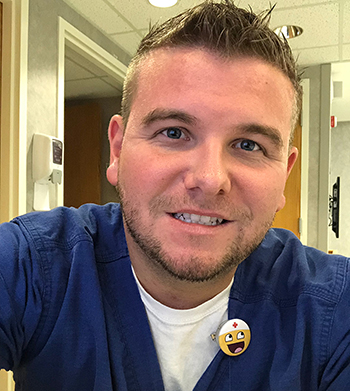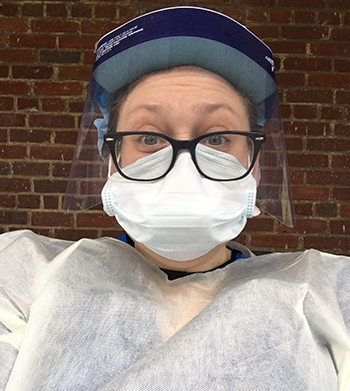College of Science
Alumni and Giving
Nurses with ties to MSU at epicenter of pandemic


Tim Smallwood is a student in MSU’s Master of Science in Nursing (MSN) program who will graduate in December. Smallwood is working at Brooklyn’s Maimonides Medical Center. Smallwood said he wanted to work in New York because he wanted to be of use in the place he was needed the most. He contacted a medical staffing agency and was able to get the job at Maimonides.
“I reached out to see where the biggest need was,” said Smallwood. “The way the media was going on about all the cases and the nurses being overwhelmed, I wanted to help.”
Smallwood said he’s learning a lot while serving patients in Brooklyn, but one of the greatest lessons he’s learning is to be a good patient advocate, working with doctors and other medical professionals to provide compassionate care for patients. He said it’s challenging work because he must wear personal protective equipment (PPE) and the treatment protocol for COVID-19 patients is new. He said the work takes an emotional toll because patients must be so isolated.
“It’s a sad situation because there’s no family there for the patients,” he said.
In terms of his safety, Smallwood said he’s aware of the risks but is taking all the precautions he can to keep himself safe.
“I do have concerns because I know the virus doesn’t discriminate,” he said. “Right now, I know I’m healthy, and those people need me. They need people there to give them the treatment and care they deserve.”
Across the East River, Jessica Glinski-Elliott is working at New York Health + Hospital/Coler on Roosevelt Island, a nursing home that was renovated to treat COVID-19 patients who are recovering and have been taken off ventilators. She graduated from MSU’s Bachelor of Science in Nursing (BSN) pre-licensure program in 2012 and is a doctoral nursing student at Valparaiso University. Before the pandemic, she was an oncology nurse at Porter Regional Hospital in her hometown of Valparaiso, Indiana.
Glinski-Elliott said she decided to go to New York to help after talking to a friend who had been recruited to work in New York by the Federal Emergency Management Agency (FEMA).
“It was an opportunity for me to come here and help,” she said. “We’re all transplants, the workers who came here to help are from all different states. This is something I really wanted to do.”
Glinski-Elliott said that although the patients she works with are improving, they still have COVID-19 and are still contagious, and therefore must be isolated. Patients are assigned four to a room in the facility where she works, and there are no televisions or comfort features, making isolation even more difficult for patients.
“It’s really sad because they are unable to talk with their families,” Glinski-Elliott said. “They’re just people at the end of the day, and they’re lonely and they need help. I see them getting better and hopefully, the next step for them is getting discharged to go home.”
Like all hospitals, the facility where Glinski-Elliott works is short on PPE supplies and other essential equipment. She said this has caused her to realize how much modern nursing relies on technology and added that the current situation requires nurses to think outside the box to make the most of what they have to treat patients.
“Every day is a new challenge to overcome, and I feel like I’m growing as a nurse,” she said.
For more information about nursing programs at MSU, visit www.moreheadstate.edu/nursing, email nursingdept@moreheadstate.edu or call 606-783-2296.
